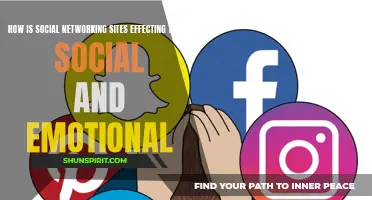
Have you ever found yourself grappling with attachment to someone, desperately seeking their approval, or feeling overwhelmed by emotions whenever they are involved? In a world where emotional connections are a vital part of our lives, it's crucial to strike a balance between being connected without losing ourselves. Learning how to be emotionally unattached to someone can empower us to maintain healthy relationships, prioritize our own well-being, and find inner peace amidst the chaos of emotions. So, if you're ready to embark on a journey of emotional freedom, join me as we explore the strategies and insights that can help us navigate the intricacies of emotional detachment.
| Characteristics | Values |
|---|---|
| Acceptance | Not getting emotionally attached means accepting the fact that people come and go in life. You understand that attachments can sometimes lead to pain, and you are willing to let go and move on when necessary. |
| Self-awareness | To be emotionally unattached, you need to be aware of your own emotions and how they influence your relationships. Recognize patterns of attachment and work on managing them. |
| Independence | Emotionally unattached individuals value their independence and do not rely heavily on others for emotional support or validation. They are self-reliant and find happiness within themselves. |
| Boundaries | Creating healthy boundaries is essential in being emotionally unattached. This means clearly defining what is acceptable and not tolerating behaviors that go against your values or well-being. |
| Non-attachment | Practicing non-attachment means not clinging to expectations or outcomes in relationships. You accept things as they come and avoid placing your happiness or worth on the actions of others. |
| Emotional resilience | Emotionally unattached individuals are resilient in the face of emotional challenges. They can handle rejection and disappointment without letting it affect them deeply. |
| Self-care | Prioritizing self-care is crucial in being emotionally unattached. Taking care of your physical, mental, and emotional well-being allows you to maintain balance and not rely on others for fulfillment. |
| Mindfulness | Being present and mindful in your relationships can help in being emotionally unattached. It allows you to fully experience the moment without getting too attached to thoughts or expectations. |
| Communication | Emotionally unattached individuals communicate their needs and emotions effectively without becoming excessively attached to others' reactions or responses. |
| Personal growth | Focusing on personal growth and development helps in being emotionally unattached. Striving to improve oneself allows for a healthier perspective on relationships and avoids excessive attachment. |
What You'll Learn

Understanding Emotions and Attachment
Emotions are a vital part of being human. They can bring us joy, happiness, and love, but they can also make us vulnerable and attached to others. Developing healthy emotional detachment can be beneficial in maintaining our own well-being and creating healthier relationships.
Emotional attachment is the feeling of being strongly connected to someone else, often accompanied by a sense of dependence and a fear of separation or loss. It is a natural and instinctual response that is deeply ingrained in our biology. It can be formed with romantic partners, close friends, family members, or even pets.
While attachment is an essential part of forming healthy relationships, problems can arise when we become excessively dependent on others for our happiness or well-being. This overreliance can lead to anxiety, insecurity, and a lack of personal autonomy.
Emotional detachment does not mean shutting off all emotions or cutting off all relationships. Instead, it refers to being able to separate our emotional well-being from the actions and behaviors of others. It allows us to maintain a sense of self and make decisions based on our own needs and values.
Benefits of emotional detachment include:
- Improved self-esteem: By not relying on others for validation and self-worth, we can develop a stronger sense of self-esteem and self-confidence.
- Enhanced personal growth: Emotional detachment frees us from being overly influenced by others' opinions and allows us to focus on our own personal growth and goals.
- Better decision-making: When we are emotionally detached, we can make decisions based on rationality and logic rather than being swayed by our emotions.
- Healthier relationships: Emotional detachment helps avoid codependency and allows us to have healthier, more balanced relationships where both parties can maintain their individuality.
How to Develop Emotional Detachment
- Practice self-awareness: Start by becoming aware of your own emotions and how they are connected to others. Recognize when you may be overly attached or dependent on someone for your happiness or well-being.
- Set boundaries: Clearly define and communicate your personal boundaries in relationships. Do not compromise your values or needs for the sake of pleasing others or avoiding conflict.
- Focus on self-care: Take care of your own physical, emotional, and mental well-being. Engage in activities that bring you joy and make self-care a priority in your daily life.
- Cultivate independence: Nurture your own interests, hobbies, and friendships outside of your primary relationships. This will help you maintain a sense of individuality and avoid excessive reliance on others.
- Practice mindfulness: Mindfulness meditation can help you develop a non-judgmental awareness of your thoughts and feelings. This can aid in detaching yourself emotionally from specific situations or people.
- Seek professional help: If you find it challenging to develop emotional detachment on your own, consider seeking the help of a therapist or counselor who can guide you through the process. They can offer valuable insights and techniques to help you develop healthier emotional boundaries.
Emotional detachment is a skill that takes time and practice to develop. Remember, it's not about completely shutting off your emotions or becoming indifferent, but about finding a healthier balance between your own well-being and your relationships with others. By working on developing emotional detachment, you can create healthier relationships, cultivate personal growth, and enhance your overall well-being.
Exploring the Power of Art in Expressing Emotions
You may want to see also

Identifying Unhealthy Attachments
In any relationship, it is common to form attachments to the people we care about. While attachment can be healthy, it can also become unhealthy if it leads to emotional dependency or an inability to function independently. Identifying unhealthy attachments is crucial for maintaining our emotional well-being and personal growth. In this article, we will explore some signs of unhealthy attachments and provide guidance on how to become emotionally unattached to someone.
- Excessive need for validation: If you constantly seek validation and approval from someone, it may indicate an unhealthy attachment. You may rely on their opinions and compliments to feel good about yourself. To become emotionally unattached, work on building your self-esteem and finding validation from within. Practice self-acceptance and celebrate your own accomplishments.
- Fear of abandonment: The fear of being left alone or rejected can create an unhealthy attachment to someone. You may go to great lengths to please them or avoid conflict at all costs. To overcome this fear, focus on building a strong support network and developing self-reliance. Remind yourself that you are capable of handling challenges and that your worth does not depend on someone else.
- Neglecting personal needs and boundaries: When you prioritize someone else's needs over your own, it can indicate an unhealthy attachment. You may ignore or suppress your own desires, compromising on your values or personal boundaries. Practice self-care and assertiveness to establish healthy boundaries. Prioritize your own needs and communicate them in a respectful manner.
- Difficulty accepting rejection: Rejection is a part of life, but if you find it extremely difficult to accept rejection from someone, it may indicate an unhealthy attachment. You may become overly upset or desperate to win their approval, even when it is not reciprocated. Remember that rejection does not define your worth and that there are plenty of other people who will appreciate and respect you.
- Loss of individual identity: When you lose sight of your own interests, goals, and values, it can be a sign of an unhealthy attachment. You may adopt the interests and opinions of the person you are attached to, losing your individuality in the process. To regain your individual identity, reconnect with your passions and hobbies. Take time to reflect on your own values and set personal goals separate from your relationship with that person.
How to become emotionally unattached:
- Self-reflection: Take time to reflect on your attachments and identify any unhealthy patterns. Be honest with yourself and evaluate the impact these attachments have on your well-being.
- Seek support: Engage in therapy or seek support from trusted friends or family members. They can offer insight and guidance as you work on becoming emotionally unattached.
- Focus on personal growth: Invest time and energy into personal development. Pursue your own goals and passions, independent of anyone else. Discover your own identity and learn to rely on yourself for fulfillment and happiness.
- Practice self-care: Prioritize self-care activities that nourish your mind, body, and soul. Engage in activities that you find enjoyable and fulfilling. Take care of your physical and emotional needs, and develop healthy habits that promote self-love and well-being.
- Let go of expectations: Release any unrealistic expectations you may have of yourself or others. Understand that you cannot control the actions or feelings of others and that it is essential to focus on your own happiness and growth.
Becoming emotionally unattached to someone may take time and effort. It is important to be patient with yourself and understand that this process is about creating a healthier and more balanced approach to relationships. By identifying unhealthy attachments and working towards emotional independence, you can cultivate a greater sense of self-worth and create healthier, more fulfilling connections with others.
Unlocking the Secret: Discover How to Find a Man with Emotional Intelligence
You may want to see also

Practicing Emotional Detachment Techniques
Emotional attachment to someone can be a beautiful thing, but there may come a time when it becomes necessary to practice emotional detachment for the sake of your own well-being. Whether you're going through a difficult breakup, dealing with a toxic relationship, or trying to find inner peace, learning how to be emotionally unattached to someone is an important skill. By practicing emotional detachment techniques, you can regain control over your emotions and live a happier, more fulfilling life.
- Recognize the signs of emotional attachment: The first step in practicing emotional detachment is being able to recognize the signs of emotional attachment. Common signs include constantly thinking about the person, feeling an intense need for their love or approval, and experiencing fear or anxiety when they are not around. By becoming aware of these signs, you can begin to take steps towards detachment.
- Set boundaries: Setting clear boundaries is crucial when it comes to practicing emotional detachment. Boundaries help to protect your emotional well-being and prevent others from draining your energy. Communicate your boundaries to the person and stick to them, even if it feels uncomfortable at first. Remember, it's okay to prioritize your own needs.
- Focus on self-care: Taking care of yourself is essential when practicing emotional detachment. Engage in activities that bring you joy and provide a sense of fulfillment. This could include exercise, spending time in nature, practicing mindfulness or meditation, or pursuing hobbies and interests. Prioritizing self-care helps you build a stronger sense of self and increases your resistance to emotional dependence.
- Practice self-awareness: Developing self-awareness is an important aspect of emotional detachment. Pay attention to your thoughts, feelings, and behaviors when it comes to the person you want to detach from. Analyze why you are so emotionally attached and what needs, fears, or insecurities are driving this attachment. By gaining a deeper understanding of yourself, you can start to challenge and change unhealthy patterns of attachment.
- Challenge irrational beliefs: Often, emotional attachment is fueled by irrational beliefs or unrealistic expectations. Challenge these beliefs by questioning their validity and looking for evidence that contradicts them. For example, if you believe that you need someone in order to be happy, look for instances where you have found happiness without that person. By examining and challenging these beliefs, you can begin to let go of them and reduce emotional attachment.
- Practice detachment in small steps: Detachment is not something that happens overnight, but with practice, you can gradually detach yourself emotionally. Start by spending less time with the person or reducing contact. Allow yourself to experience uncomfortable emotions that may arise, and remind yourself that these feelings are temporary. As you slowly detach, you will find that your emotional dependence lessens over time.
- Seek support: Practicing emotional detachment can be challenging, and having a support system can be extremely beneficial. Reach out to friends, family members, or a therapist who can provide guidance, understanding, and encouragement throughout the process. Surrounding yourself with positive and supportive individuals can make it easier to detach emotionally from someone.
Remember, emotional detachment does not mean cutting off all emotions or becoming cold and unfeeling. It simply means finding a healthy balance where you are no longer overly dependent on someone else for your happiness and well-being. By practicing these emotional detachment techniques, you can regain control over your own emotions and live a more fulfilled life.
Understanding the Relationship Between Mental Illness and Emotional Control
You may want to see also

Cultivating Self-Compassion and Personal Growth
Emotional attachment to someone can be both rewarding and challenging. However, there are situations where it becomes necessary to detach ourselves emotionally. This could be due to an unhealthy relationship, the need for personal growth, or simply moving on from a past love. Cultivating self-compassion is crucial during this process as it allows us to be kind and understanding towards ourselves. In this article, we will explore practical steps to help you emotionally detach from someone while fostering personal growth and self-compassion.
Reflect on your emotions:
Begin by acknowledging and accepting the emotions you are experiencing. Take the time to identify and name them. Understand that these emotions are normal and valid, but also recognize that you have the power to regulate them. Reflect on the reasons you want to detach from this person and how it aligns with your personal growth.
Set clear boundaries:
Establishing boundaries is essential when detaching from someone emotionally. These boundaries can come in different forms, such as limiting contact, setting space and time for yourself, or even ending the relationship if necessary. Communicate these boundaries honestly and assertively, ensuring they align with your needs and emotional wellbeing.
Practice self-compassion:
Self-compassion is the key to nurturing personal growth while detaching from someone. Treat yourself with kindness, understanding, and forgiveness throughout this process. Remember that it's okay to feel a range of emotions, and it's natural to grieve the loss or change. Allow yourself to heal and grow by being gentle towards yourself.
Focus on personal growth:
Detaching from someone allows you the space and freedom to focus on personal growth. Explore different aspects of your life that you may have neglected or put on hold while in the attachment. Set goals, learn new skills, pursue hobbies, and invest in your passions. Use this opportunity for self-discovery and self-improvement.
Surround yourself with support:
Another vital aspect of detaching emotionally is having a support system. Seek out trusted friends, family members, or professionals who can provide guidance, understanding, and encouragement during this journey. Surrounding yourself with supportive people allows you to share your experiences, gain different perspectives, and receive much-needed emotional support.
Practice mindfulness:
Mindfulness can help you detach from negative emotions and thoughts related to the person you are trying to detach from. Engage in meditation, deep breathing exercises, or other mindfulness practices to stay grounded and focused on the present moment. This will help you redirect your thoughts and maintain a state of emotional balance.
Let go of resentment:
Resentment can hinder your emotional detachment process and impede personal growth. Work on forgiving the person and yourself. Remember that forgiveness does not mean forgetting or condoning any harm that may have been done. Instead, it is a conscious decision to release the negative emotions and move forward with compassion and growth.
Emotional detachment from someone can be challenging but is necessary for personal growth and wellbeing. By cultivating self-compassion, setting boundaries, focusing on personal growth, seeking support, practicing mindfulness, and letting go of resentment, you can navigate this process effectively. Remember to be patient and gentle with yourself, as personal growth takes time. Embrace this opportunity to learn, heal, and cultivate a healthier relationship with yourself.
Why Christians Should Embrace and Show Their Emotions
You may want to see also
Frequently asked questions
Building emotional detachment takes time and effort. Some strategies to help include setting clear boundaries, practicing self-care, redirecting your thoughts, and seeking support from friends or a therapist.
While it is possible to reduce emotional attachment, completely eliminating all emotions towards someone may be unrealistic. It is more beneficial to focus on finding a healthy balance and managing your emotions effectively.
Signs of emotional detachment may include a lack of interest or investment in the person's life, feeling unaffected by their actions or opinions, and finding it easy to move on from the relationship or situation without much emotional turmoil.







